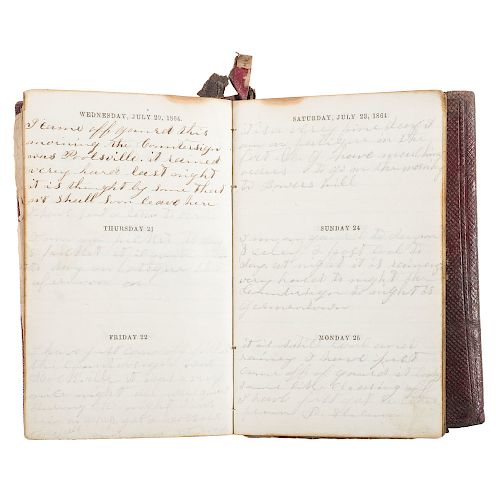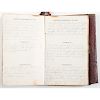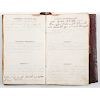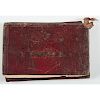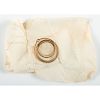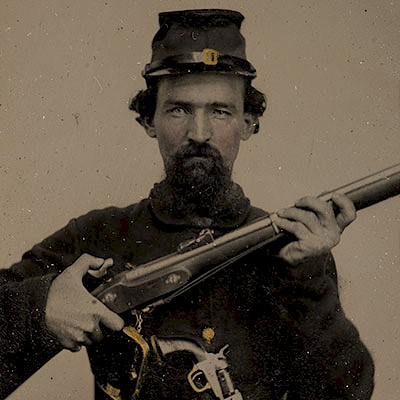1864 Civil War Diary of Eli Rockwell, 13th New York Heavy Artillery
About Seller
6270 Este Ave.
Cincinnati , OH 45232
United States
With offices in Cincinnati, Cleveland and Denver, Cowan’s holds over 40 auctions each year, with annual sales exceeding $16M. We reach buyers around the globe, and take pride in our reputation for integrity, customer service and great results. A full-service house, Cowan’s Auctions specializes in Am...Read more
Two ways to bid:
- Leave a max absentee bid and the platform will bid on your behalf up to your maximum bid during the live auction.
- Bid live during the auction and your bids will be submitted real-time to the auctioneer.
Bid Increments
| Price | Bid Increment |
|---|---|
| $0 | $25 |
| $500 | $50 |
| $1,000 | $100 |
| $2,000 | $250 |
| $5,000 | $500 |
| $10,000 | $1,000 |
| $20,000 | $2,500 |
| $50,000 | $5,000 |
| $100,000 | $10,000 |
About Auction
Jun 21, 2019
On June 21, Cowan’s Auctions will be offering a remarkable selection of historic photography, letters, documents, flags, political ephemera, and more representing the Revolutionary War-period through the Civil War, Indian Wars, and beyond, as well as the American West. Cowan's Auctions dawnie@cowans.com
- Lot Description
Pocket Diary for 1864 ("Published for the Trade"), red embossed leather, flap closure, 3 x 5 in., identified to Eli Rockwell. Also included is a lock of hair in a piece of tissue paper with " Elisha Rockwell Age 40 " written on it.
Eli Rockwell enlisted in the 13th New York Heavy Artillery in February 1864 at the age of 20 in Ischua, NY. He mustered out near the end of June 1865 and seems to have transferred to the 6th New York HA, but was mustered out in late August.
Sporadic notes are included at the beginning of the diary, but on February 19, Rockwell writes, " enlisted in the N.y. heavy art. " He was not mustered into service until March 20. Two days later, " Left Elmira between 12 - 1 oclock. arrived in N.y. 1 - 2. " The following day, " Ro[a]med over the city got lost [s]tayed over nigh to a hotel tired out. " On the 24th, " found our way back to Barracks ."
On March 25, the regiment " went from N.y. to Fort Sch[u]yler on Boat John Romer ." Fort Schuyler was built in the Bronx after the end of the War of 1812, a conflict that pointed out the need for coastal defenses. The fort was built to guard the east entrance to New York Harbor, where the East River meets Long Island Sound.
In a matter of days, the regiment left the fort at about 1 am in a fairly rough sea. He notes that many men were sea sick over night, though he was not very sick. They arrived in Alexandria (?) on March 31. The next day they were ordered to Fort Clark(?), then to Fort Rodman. On April 20, Rockwell writes, " I was on fatigue dismantling he[a]vy guns weighing 8492... " April 27: " Bat. drill at Fort Reno. missed roll call I handed my discharge paper to Capt. Stevens ."
The unit spent the war in the various forts comprising the Defenses of Washington. On May 3, Rockwell writes, " I am on guard...No. 4 guarding on the Canal. The Canal of the Dismal Swamp the Chesapeake and Albemarl canal. " The more southerly climate does not appear to have agreed with Private Rockwell. By June 8-9 he was taken to the hospital, returning to his unit on the 15th. By the end of June, he is on a rotation of guard duty and fatigue duty. On June 22, he begins recording the previous day's countersigns (the 22nd unreadable). Georgetown (27); Wilderness (7-4); Pittsburg (7-11); Tunnel Hill (7-15); Pool[e]sville (7-20); Stockville (?) (22); Germantown (24); Blondville (?) (29); Front Royal (8-2); Ske___vest (8-5); Grant (8-30); Gaines Mills (9-5); Williamsburg (9-12); Antietam (9-17); Benedict (9-28); Pea Ridge (10-5); Still Water (10-11); a few others unreadable. A few gaps correspond to episodes of illness.
Much of the time is taken up with alternating battery/artillery drills, some including target practice, and infantry drills.
On November 19, he notes " Marching orders to go to Fort Oroak [O'Rourke]. " In the Belle Haven area of Fairfax County, O'Rourke was the southernmost fort in the defenses of Washington. He notes on the 19th of several months (April, May) the anniversary of his enlistment. On December 19, he writes, " It is ten months to day since I enlisted. " Entries are scarce during December, likely because they had a bit of a break over the holidays. Rockwell does record a few days in January in the Memo section of the diary, since he apparently had not yet acquired a new diary for 1865. January 21, 1865, he notes, " rec'd a letter from my sister H. McClure. It brought to me the sad news of the death of my Father. he was taken sick on Monday 16th & died on Thursday morning at 5 o clock of the billious [sic] colic ." Unfortunately, many men suffered the deaths of loved ones back home and could not even return for funerals (which often happened before they received word of the death).
Although not the most "exciting" activity of battle service, it was absolutely essential to protect Washington. Many troops spent short periods in the forts training before moving into the field, but there needed to be more long-term guards as well, and the 13th New York Heavy Artillery was one of those units.Typical of a field diary. Rear wallet pocket missing, but still has loop for the pencil. Some leather coming off at head of spine. Scattered foxing and water stains and general handling wear. Mostly readable, but a few entries are in very light pencil (mostly at the beginning before he entered service). There are a few notes on some of the pages where Rockwell did not make diary entries with dates of 1909.Condition
- Shipping Info
-
Buyers are required to pay for all packing, shipping and insurance charges. Overseas duty charges are the responsibility of the successful Bidder. Be aware that for larger and/or valuable items, shipping charges can be substantial. - If there is no shipping amount on listed your invoice, you will need to make arrangements to pick up or ship your purchase through an alternative shipping company. Our shipping department can be contacted at 513.871.1670 (ext. 219) or email shipping@cowans.com. - Shipping charges include insurance for your order while in transit. If you have private insurance we will adjust your charge to include only packing and shipping. - Please allow 14 – 21 days after payment to package and ship your purchase as carefully as possible.
-
- Buyer's Premium



 EUR
EUR CAD
CAD AUD
AUD GBP
GBP MXN
MXN HKD
HKD CNY
CNY MYR
MYR SEK
SEK SGD
SGD CHF
CHF THB
THB